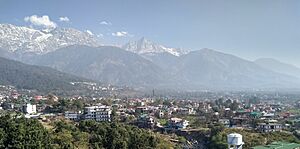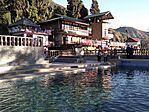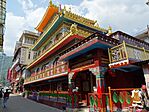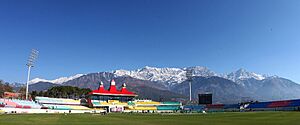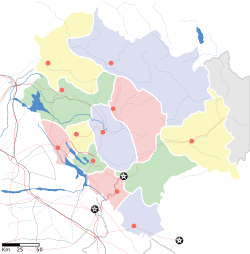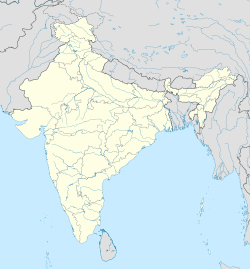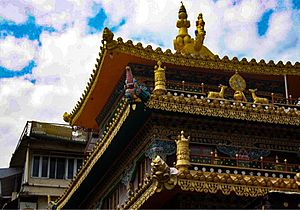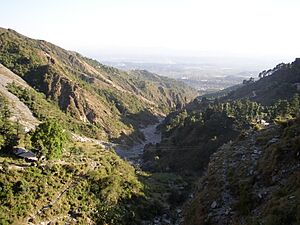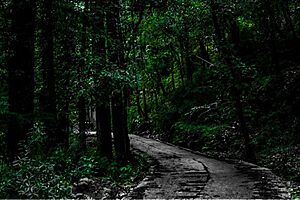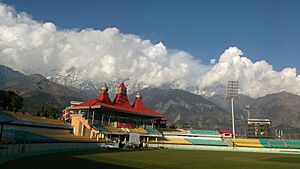Dharamshala facts for kids
Quick facts for kids
Dharamshala
Dharamsala
|
|
|---|---|
|
City
|
|
|
From top, left to right:
Skyline of Dharamsala, Mcleodganj during winter, Triund, Bhagsunag Temple, Kalachakra Temple, HPCA Stadium |
|
| Nickname(s):
Dhasa
|
|
| Country | |
| State | Himachal Pradesh |
| District | Kangra |
| Named for | Derives its name from an old Hindu sanctuary, called Dharamsàla which once stood there. |
| Member of legislative Assembly | Sudhir Sharma |
| Government | |
| • Type | Municipal Corporation |
| • Body | Dharamshala Municipal Corporation |
| Area | |
| • Total | 81.60 km2 (31.51 sq mi) |
| Elevation | 1,457 m (4,780 ft) |
| Population
(2024)
|
|
| • Total | 100,000 |
| • Rank | 2nd in HP |
| • Density | 1,200/km2 (3,200/sq mi) |
| Time zone | UTC+5:30 (IST) |
| PIN |
176 215
|
| Telephone code | +91- 01892 |
| Vehicle registration | HP- 39(RLA), 68(RTO), 01D/02D(Taxi) |
| Climate | Cwa |
Dharamshala is a city in the Indian state of Himachal Pradesh. It is the winter capital of the state. It also serves as the main office for the Kangra district. Since 1960, Dharamshala has been home to the Central Tibetan Administration, which is like the Tibetan Government-in-exile.
The city is located in the Kangra Valley. It sits beneath the Dhauladhar mountain range of the Himalayas. Dharamshala is about 1,457 meters (4,780 feet) above sea level. Ancient Hindu texts mention Dharamshala and its nearby areas. The city was a small hill station after India became independent in 1947. It became a major spiritual center when the 14th Dalai Lama moved here in 1960.
Today, Dharamshala's economy relies a lot on farming and tourism. It is a popular hill station and a spiritual hub. The city is also part of India's "Smart Cities Mission" to improve urban areas.
Contents
What Does Dharamshala Mean?
The name Dharamshala comes from a Hindi word. It is a mix of two Sanskrit words: dharma and shālā. This means 'House or place of Dharma'. In simple terms, it refers to a shelter or a rest house. These places were often used by people on spiritual journeys. The city got its name from one such rest house that used to be there.
You might see the name spelled in different ways, like Dharamsala. This is because of how Hindi words are written in English. No matter how it's spelled, the correct way to say it is with the "sh" sound, like "Dharamshala."
A Look at Dharamshala's Past
Early Times
Dharamshala and its surroundings are mentioned in old Hindu books. These include the Rig Veda and Mahabharata. People like Pāṇini (in the 4th century BC) and Chinese traveler Heun Tsang (in the 7th century AD) also wrote about the region. The first people to live here were the Gaddis. They were mostly Hindu and often moved around with their animals.
The area faced attacks from rulers like Mahmud of Ghazni and Firuz Shah Tughlaq. Later, Akbar brought it under Mughal rule in 1566. After the Mughal Empire weakened, the region came under Sikh control. Then, the Gurkhas took over for a short time. Finally, Ranjit Singh defeated them in 1809.
British Rule and a Big Earthquake
The East India Company took control of the region in 1846. This happened after the First Anglo-Sikh War. Under British rule, Dharamshala became part of the Punjab province. In 1860, a group of soldiers called the 66th Gurkha Light Infantry moved here. Dharamshala became a popular place for the British to relax.
In 1905, a huge earthquake hit the Kangra Valley. It destroyed much of Dharamshala and killed many people. About 20,000 people died in the valley, including 1,625 in Dharamshala.
After India Became Independent
After India became independent in 1947, Dharamshala remained a small hill station. A big change happened in 1959. The 14th Dalai Lama, Tenzin Gyatso, had to leave Tibet. He came to India and set up the Tibetan administration-in-exile. In 1960, this administration moved to McLeod Ganj, just north of Dharamshala.
Many Tibetan exiles have now made Dharamshala their home. They have built monasteries, temples, and schools. This has made the city an important place for Tibetan culture. It has also become a major tourist spot with many hotels and shops. In 2017, Dharamshala was officially named the winter capital of Himachal Pradesh.
Where is Dharamshala?
Dharamshala is about 1,457 meters (4,780 feet) above sea level. It covers an area of about 8.51 square kilometers (3.29 sq mi). The city is located in the Kangra Valley. It is surrounded by the beautiful Dhauladhar mountains.
The city has two main parts: "Lower Dharamshala" and McLeod Ganj. A narrow road connects these two areas. The road is lined with pine, Himalayan oak, and rhododendron trees.
Dharamshala's Weather
Dharamshala has a climate with strong monsoon rains. Summer starts in early April and gets very hot in May. Temperatures can reach 36°C (97°F). The monsoon season is from June to mid-September. During this time, Dharamshala gets a lot of rain, sometimes up to 3000 mm (118 inches). This makes it one of the wettest places in the state.
Autumn is mild and lasts from October to November. Winter begins in December and ends in February. Snow and sleet are common in the higher parts of Dharamshala, like McLeodganj. The lower parts usually get less snow. The Dhauladhar mountains used to be covered in snow all year. But lately, they have been losing their snow during dry periods.
| Month | Jan | Feb | Mar | Apr | May | Jun | Jul | Aug | Sep | Oct | Nov | Dec | Year |
|---|---|---|---|---|---|---|---|---|---|---|---|---|---|
| Record high °C (°F) | 24.7 (76.5) |
28.0 (82.4) |
31.6 (88.9) |
35.6 (96.1) |
38.6 (101.5) |
38.6 (101.5) |
42.7 (108.9) |
37.8 (100.0) |
34.8 (94.6) |
34.6 (94.3) |
26.6 (79.9) |
27.2 (81.0) |
42.7 (108.9) |
| Mean daily maximum °C (°F) | 15.7 (60.3) |
17.1 (62.8) |
21.5 (70.7) |
26.5 (79.7) |
30.3 (86.5) |
31.2 (88.2) |
27.3 (81.1) |
26.6 (79.9) |
26.6 (79.9) |
25.2 (77.4) |
21.7 (71.1) |
17.8 (64.0) |
24.0 (75.2) |
| Mean daily minimum °C (°F) | 6.0 (42.8) |
7.3 (45.1) |
10.9 (51.6) |
15.4 (59.7) |
19.1 (66.4) |
20.9 (69.6) |
20.0 (68.0) |
19.7 (67.5) |
18.0 (64.4) |
14.3 (57.7) |
10.3 (50.5) |
7.2 (45.0) |
14.1 (57.4) |
| Record low °C (°F) | −1.9 (28.6) |
−1.6 (29.1) |
2.4 (36.3) |
7.3 (45.1) |
8.4 (47.1) |
12.6 (54.7) |
14.3 (57.7) |
14.1 (57.4) |
11.2 (52.2) |
8.0 (46.4) |
4.8 (40.6) |
−1.0 (30.2) |
−1.9 (28.6) |
| Average rainfall mm (inches) | 83.6 (3.29) |
128.3 (5.05) |
111.3 (4.38) |
65.7 (2.59) |
72.4 (2.85) |
279.0 (10.98) |
859.0 (33.82) |
942.3 (37.10) |
377.7 (14.87) |
52.6 (2.07) |
18.8 (0.74) |
36.6 (1.44) |
3,027.3 (119.18) |
| Average rainy days | 4.5 | 6.1 | 6.4 | 5.2 | 5.2 | 9.8 | 20.6 | 22.4 | 13.0 | 2.8 | 1.4 | 2.8 | 100.2 |
| Average relative humidity (%) (at 17:30 IST) | 66 | 63 | 54 | 47 | 45 | 53 | 80 | 86 | 78 | 63 | 62 | 65 | 63 |
| Source: India Meteorological Department | |||||||||||||
Who Lives in Dharamshala?
| Religions in Dharamsala | ||||
|---|---|---|---|---|
| Religion | Percent | |||
| Hinduism | 69.18% | |||
| Buddhism | 27.70% | |||
| Sikhism | 1.28% | |||
| Others | 1.85% | |||
In 2011, Dharamshala had a population of 30,764 people. By 2015, the city's area grew, and its population was about 53,543. Most people living here are male (55%). The city has a high literacy rate of 87%, which is better than the national average.
Hinduism is the most common religion, followed by Buddhism. Hindi is the main language spoken. Other languages include Gaddi, Kangri, English, and Lhasa Tibetan.
Dharamshala's Economy
The economy of Dharamshala mainly depends on agriculture (farming) and tourism. Farmers in the valley grow crops like rice, wheat, and tea. Dharamshala is famous for its Kangra tea. This tea has a special status because of where it comes from.
Dharamshala is a popular hill station and a spiritual center. It offers many trekking trails into the Himalayas. You can hike to places like Indrahar Pass, Kareri Lake, and Triund. These trails offer amazing views and adventures.
Getting Around Dharamshala
Road Travel
NH 503 starts from Dharamshala. It connects the city to Hoshiarpur in Punjab. Other state highways link Dharamshala to NH 154. Buses are available to travel to and from nearby towns and cities.
By Air
The closest airport is Kangra Ghaggal airport. It is about 12 kilometers (7.5 miles) south of the city.
By Train
The nearest major train station is Pathankot, which is about 90 kilometers (56 miles) away. There is also a narrow-gauge railway called the Kangra Valley Railway. It runs from Pathankot, Punjab to Jogindernagar. The closest station to Dharamshala on this line is Chamunda Marg.
Ropeway
A new way to travel is the Dharamshala Skyway. This 1.8-kilometer (1.1-mile) long ropeway connects Dharamshala and Mcleodganj by cable car. It opened in January 2022.
Learning in Dharamshala
Dharamshala has important educational places. These include the Central University of Himachal Pradesh and the Government College of Teacher Education Dharamsala.
Fun and Sports
The Himachal Pradesh Cricket Association Stadium is a famous cricket stadium in Dharamshala. It is one of the highest cricket stadiums in the world, located at 1317 meters (4,321 feet) above sea level. It can hold 23,000 people. It is the home ground for the Himachal Pradesh cricket team.
You can find traditional shopping streets in Kotwali Bazaar. There are also malls and movie theaters on the National Highway Road. The DIFF started in 2012. It helps promote modern art and movies in the Himalayan region. Hari Kothi is a historic building in the city.
Famous People from Dharamshala
- Mehr Chand Mahajan (1889–1967), a former top judge of India.
- Chandrarekha Dhadwal (born 1951), a writer, poet, and novelist.
- Tenzin Gyatso, the 14th Dalai Lama.
- James Bruce, 8th Earl of Elgin, a historical figure.
- Kishan Kapoor, a Member of Parliament.
- Sher Jung Thapa, an Indian Army officer.
- Chandresh Kumari Katoch, a former government minister.
- Sudhir Sharma, a politician.
See also
 In Spanish: Dharamsala para niños
In Spanish: Dharamsala para niños


